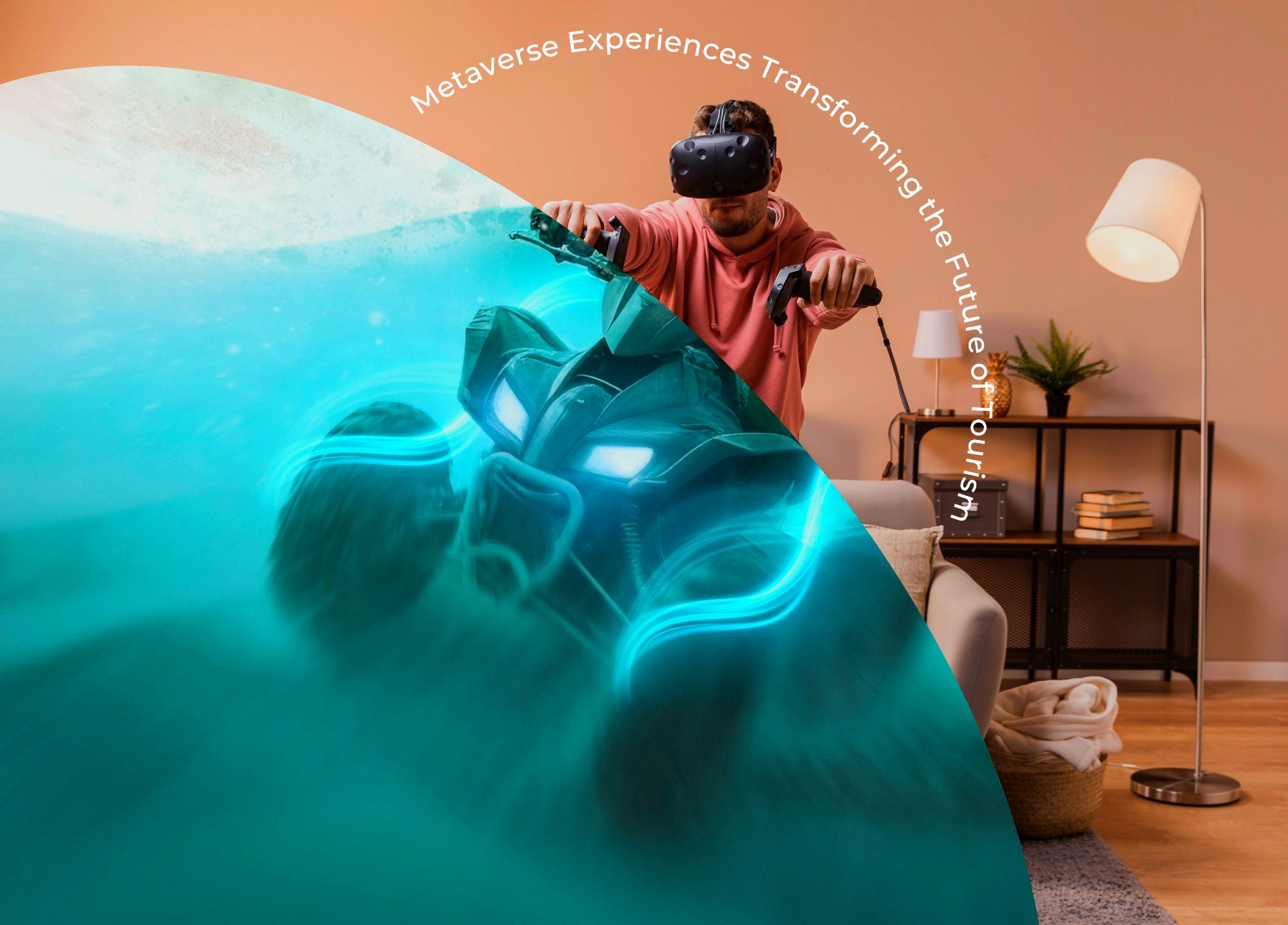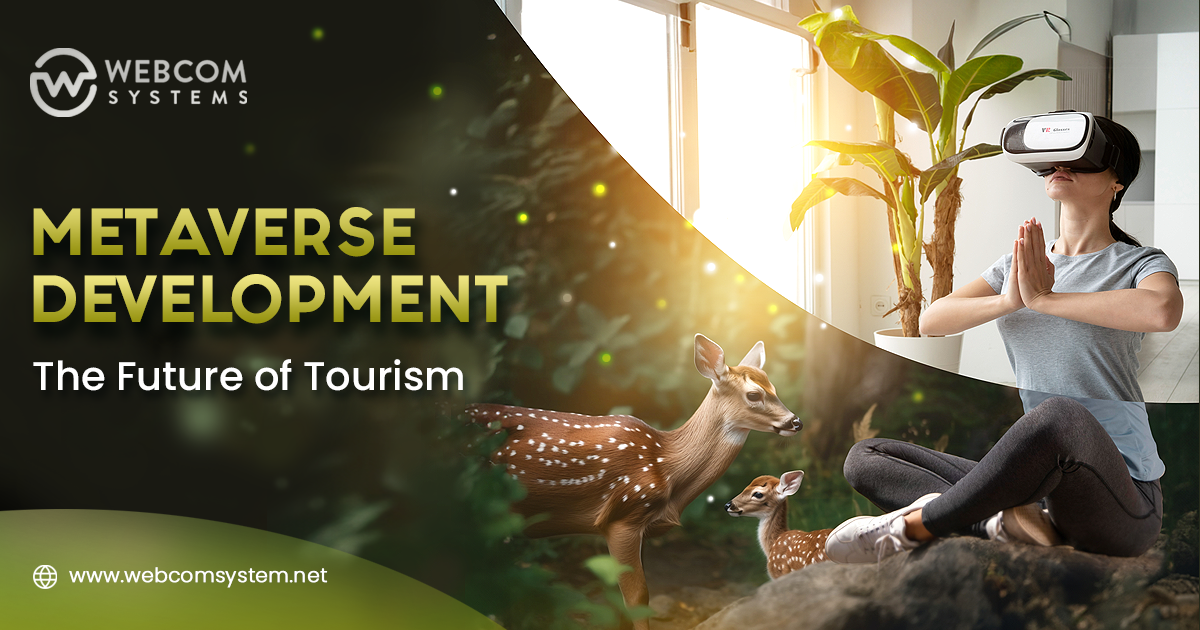The tourism industry has been evolving rapidly over the past few years, with technological advancements playing a significant role in shaping its future. One such technology that is gaining popularity in the tourism industry is the Metaverse. The Metaverse is a virtual world where users can engage with other users and an artificially created atmosphere in real-time. It is a new realm that is emerging as an exciting opportunity for the tourism industry. From the comfort of their own homes, tourists can discover fresh locations and cultures. Interactive educational experiences, virtual tours, and captivating gaming adventures are just some of the endless possibilities.
Therefore, this blog will explore how Metaverse is shaping the future of the Tourism App Development industry and explore some of its potential benefits and key considerations for adoption.
Metaverse Experiences Transforming the Future of Tourism
Metaverse technology is transforming the tourism industry by offering new and innovative ways for people to travel and experience the world.

Here are some of the ways Metaverse technology is shaping the future of tourism:
- Virtual tourism experiences: Metaverse technology is creating virtual tourism experiences that allow people to travel to different parts of the world without leaving their homes. This is particularly useful during times of travel restrictions or when people cannot afford to travel.
- Innovative marketing: The Metaverse creates a $13 billion opportunity for tourism inspiration, mostly driven by digital travel advertising. Metaverse development is enabling tourism companies to create innovative marketing campaigns that can attract more customers and provide them with unique experiences.
- Enhanced customer experiences: Metaverse development is enabling tourism companies to create more compelling experiences for their customers. By using the Metaverse, tourism companies can offer personalized and immersive experiences that are not possible in the physical world.
- Cost-effective: Metaverse development is a cost-effective way for tourism companies to offer unique experiences to their customers. By using virtual reality and other technologies, tourism companies can create experiences that are less expensive than physical ones.
- Sustainable tourism: Metaverse development can help promote sustainable tourism by reducing the carbon footprint associated with travel. By offering virtual tourism experiences, tourism companies can reduce the number of people travelling to certain destinations.
Metaverse in the Travel and Tourism – A Market Overview
The Metaverse is emerging as a new phase for the travel industry. Instead of physically visiting places, the travel Metaverse is being widely accepted as a replacement. In the Metaverse, such organizations as hotel chains, tour operators, and travel agencies are advertising their services. How people travel and their perspective on travel have been influenced by the Metaverse.
Counting the advantages of travel in the Metaverse, one thing is clear – stepping into the Metaverse travel and tourism industry is feasible.
The Metaverse offers a range of benefits for the tourism industry, including:
- Increased accessibility: The Metaverse makes travel more accessible to people who may not have the means to travel physically. From the comfort of their own homes, people can explore new places and cultures.
- Personalized experiences: The Metaverse allows tourism companies to offer personalized experiences to their customers. Companies in the tourism industry can customize experiences to suit individual preferences by using data and analytics.
- Less Expensive: The Metaverse is a cost-effective way for tourism companies to offer unique experiences to their customers. Virtual reality and technology can enable tourism companies to establish less expensive alternatives to actual trips.
- Personalized recommendations: Metaverse technology uses data and analytics to provide personalized recommendations to travellers based on their interests and preferences. Because of this discovering new destinations and experiences is possible for the travellers.
- Virtual Hotel Tour: Metaverse technology is transforming the travel industry by offering new and innovative ways for people to explore and experience the world. From virtual tours of hotels to interactive educational experiences and gaming adventures, Metaverse technology can create a more personalized and immersive experience for travellers.
- Virtual Events: Metaverse technology can be used to conduct virtual events, which can provide an immersive and interactive experience for attendees. Due to restrictions on live audiences during the pandemic, event companies suffered a significant loss in ticket sales and revenue. However, the travel industry’s metaverse can be a game-changer for event companies.
Use Cases of Metaverse in Travel

There are several use cases of Metaverse technology in the travel industry. Here are some examples:
- Virtual tours: Tourism companies can create virtual tours of popular destinations, allowing people to explore new places without leaving their homes.
- Interactive educational experiences: Tourism companies can create interactive educational experiences that allow people to learn about different cultures and destinations.
- Gaming adventures: Tourism companies can create gaming adventures that allow people to explore new destinations and cultures in a fun and engaging way.
- Customized virtual environment: Metaverse technology allows customers to customize their virtual environment to meet their individual needs and preferences.
How can metaverse technology provide a more personalized experience for travellers compared to traditional tourism?
Metaverse technology can create interactive educational experiences that allow travellers to learn about different cultures and destinations in a personalized way. In a more realistic and engaging way, technology can allow travellers to experience a destination. This can help travellers feel more connected to the places they are visiting. Metaverse technology can revolutionize the way travellers book their trips and make payments. Travelers can easily search for desired activities and attractions, view available options, and make payments in an immersive virtual environment. This can provide a more personalized and seamless booking experience for travellers.
Key Considerations for Adoption
Collaboration between stakeholders and partners must be considered during the adoption of Metaverse technologies for tourism. With different stakeholders in mind, the Metaverse presents opportunities for collaboration. As the industry evolves, the Metaverse will prove to be increasingly useful for companies seeking to amaze their customers with fresh and exciting experiences.
The Bottom Line
Metaverse technology is transforming the tourism industry by offering new and innovative ways for people to travel and experience the world. Companies in the tourism industry can enhance customer satisfaction through customized, sustainable, and budget-friendly experiences. Tourism’s future will be greatly influenced by the emergence of the Metaverse. More and more businesses, driven by industry progress, are now using the Metaverse to provide unique experiences and items to their customers.
Webcom Systems play a crucial role in the development of Metaverse technology in the tourism industry. By enabling interoperability between decentralized worlds, protecting data security, creating virtual tourist information services, developing virtual storefronts, NFTs, and collectables, collaborating with stakeholders and partners, and creating immersive experiences, Webcom systems help in the seamless integration of Metaverse technology in the tourism industry.
Recommended Read: Reasons To Hire Blockchain Development Services Company

